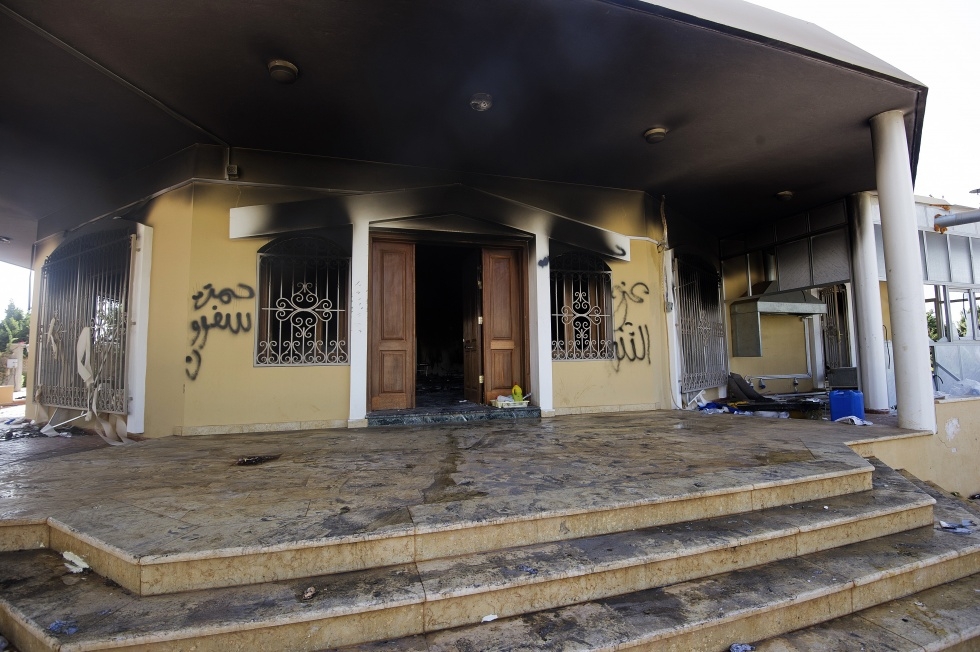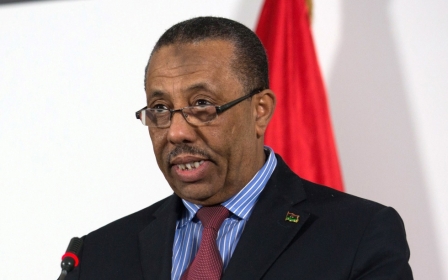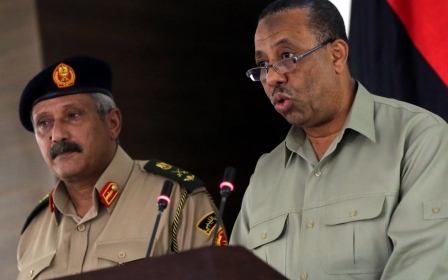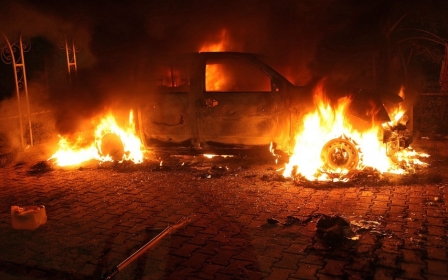Dangerous perceptions over US role in Libyan turmoil

Former General Khalifa Haftar’s (or Hiftar’s) eastern-based military challenge against parliamentary Islamists and armed Muslim extremists continues to spark more violence. Meanwhile, government authority in the capital of Tripoli has practically disintegrated with two rival prime ministers and a parliament bitterly split between Islamists and more secular elements. Amidst this chaotic scene, the threat to foreign embassies has increased, including to the US, by Libya’s leading terrorist group.
Haftar presses on
Although failing to capture enough organized support across Libya to make decisive gains, Haftar has been able to sustain a robust challenge from his eastern perch. He has found a ready constituency across the country among relatively more secular - even some moderate Islamist - Libyans weary of militia-dominated politics, governmental division, and Islamic extremist violence.
The extent of popular opposition to Islamic militants is illustrated by the personality cult now evident in various locales built around Egypt’s General Abdel Fattah al-Sisi. Posters of al-Sisi and scattered demonstrations in favor of his presidential bid in Egypt since Haftar began his military challenge last month clearly show many Libyans want Haftar to assume a similar role in Libya, cracking down harshly on the extremists.
Libya’s 2012 parliamentary elections (only a month after Mohamed Morsi’s election as Egyptian president) resulted in a noticeably more secular/liberal line-up than Morsi achieved in Egypt. And this was before Morsi’s abuses of power began undermining his image as a relative moderate.
The possibility of valuable support to Haftar was noted in a May 30 Stratfor assessment: although unconfirmed, Haftar could be receiving Egyptian military aid in various forms. In fact, the Tripoli-based Libyan newspaper al-Wasat claimed on June 2 that Libya’s pro-Haftar minister of culture flew to Cairo along with the foreign affairs, civil society and health ministers seeking “assistance in calming the situation.” The largely al-Sisi controlled Egyptian media has, naturally, favoured Haftar. So a measure of concrete Egyptian aid for Haftar either now or in the future is a real possibility.
Fighting in the east especially has continued as Haftar has launched more ground and air attacks against Ansar al-Sharia in Libya (ASL), the most dangerous jihadist militia based there (declared a terrorist organization by the US). Earlier this month, air force assets and Libyan Special Forces troops siding with Haftar attacked ASL facilities in and to the east of Benghazi. In the face of air strikes from helicopters and jets, ASL combatants fought back hard. Multiple rocket launcher fire also was exchanged. Casualties were over 100 by June 2, but the fighting appears to have been militarily inconclusive.
Meanwhile, the near continuous clashes have shut down Benghazi. In the latest bombardments, errant bombs hit the university, rockets fell on a warehouse district, and various munitions have fallen in residential neighbourhoods.
A tale of two prime ministers
Compounding Libya’s travails, a dispute has been raging since last month over who holds the office of Libya’s prime minister. Islamists, supported by a number of parliamentary independents in Libya’s General National Congress (GNC), appointed — over bitter secularist opposition — a businessman backed by the Libyan Muslim Brotherhood, Ahmed Miitig. However, Miitig failed to receive sufficient votes on the first ballot, and the shadowy second ballot that elected him has raised serious questions.
Since that controversial early May vote, Interim Prime Minister Abdullah al-Thani has refused to step down, citing conflicting instructions from the GNC members following the vote. Later in May, the Libyan justice ministry’s legal department ruled that Miitig’s election had been illegal. Finally, on June 5, an official of Libya’s Supreme Court said the manner of Miitig’s election violated Libya’s standing temporary constitution. But al-Thani said a final court statement would not be issued until June 9.
Two days earlier, Miitig, backed by some militiamen and police, took the prime minister’s office from al-Thani and held his first meeting with his new cabinet. The GNC’s Islamist Speaker Nuri Abu Sahmain also ordered the Libyan Central Bank to freeze all government accounts to cut off al-Thani’s cabinet ministers from funding their activities. Al-Thani, however, remained defiant, awaiting word from the court.
While it might appear that the standoff is being resolved in al-Thani’s favor, the situation is likely to remain chaotic. GNC Islamists, and possibly their militia ally (the Libyan Central Shield from nearby Misrata) doubtless have been angered and may stand by Miitig, trying to arrange another GNC vote in his favour. Al-Thani went to Benghazi yesterday to express sympathy over the city’s plight, perhaps tellingly visiting with Libyan Special Forces there that have sided openly with General Haftar.
Rising potential threat to the US Embassy
On 27 May, Ansar al-Sharia leader Mohammad al-Zahawi called Haftar an “American agent” on Libyan TV and warned if the US continued to back him it would suffer a “shameful defeat”. The State Department quickly said there has been no US contact with Haftar and no support, either “explicit” or “implicit”.
Nonetheless, with Zahawi’s group declared a terrorist entity by Washington and now Haftar’s most notable target, widespread belief probably exists among Libyan jihadists that Haftar has gotten some sort of American assistance. In any case, the US promptly warned its citizens against traveling to Libya and those already there to depart immediately, describing the situation on the ground there as “unpredictable and unstable”. On 5 June a Swiss worker with the Red Cross was murdered in the Libyan coastal city of Sirte by unknown gunmen.
Although an elite US military evacuation (or rescue) force, depending on the circumstances, has been poised in Sicily for over two weeks, US Embassy personnel in Tripoli have not been withdrawn. According to the State Department, embassy staffing is somewhat limited “because of security concerns.” On May 27, State Department Spokesperson Jen Psaki said the US is continuing “to review the situation and address embassy security concerns”.
Last month, the US, along with other major European players, appointed Libyan envoys to work with the UN in trying to engage with Libyan actors interested in “political transition”. UN Libyan Envoy Tareq Mitri, reportedly roughed up by militiamen on his arrival in Tripoli on 4 June, warned that it’s ultimately up to Libyans to solve their own problems.
The bottom line now is that with a robust challenge to central authority, governance and the small Libyan military in disarray, militias gaining more sway in Tripoli, and the ASL increasingly under attack and hitting back, there is no coherent security outside the US embassy’s walls. This was illustrated on 4 June; hours after Haftar survived a probable ASL truck bombing at his compound near Benghazi, gunmen fired a rocket propelled grenade (RPG) into the same floor of the prime ministerial building in Tripoli that houses Miitig’s office.
This apparent tit-for-tat assault (Haftar views Islamists in the GNC backing Miitig as aiding “terrorists”) again shows just how vulnerable Libya’s prime ministers have been. Ali Ziedan last year was kidnapped from his office by a militia on the government’s own payroll, al-Thani’s home was assaulted (unsuccessfully) by gunmen in March, and now it’s clear that Miitig has been unable to secure the area surrounding his own offices.
If the very core of governance can be struck so easily, any thought of meaningful local assistance to resist a violent attack against the US embassy is misplaced. And, with embassy staff shielded by defensive walls only meant to slow down attackers, plus a small US Marine security guard contingent not meant to resist a determined attack, reliable local government security is needed for protection. This is true for US embassies around the world. Moreover, aside from the endemic violence that’s now pervasive, it’s not even clear which parts of the government - let alone militias supposedly working for the government - currently answer to whom.
It is imperative for the White House to act quickly to preclude a possible tragedy in Tripoli that could be far more costly than the September 2012 assault on the more thinly staffed US consulate facilities in Benghazi. In fact, a rescue attempt amidst an attack on the embassy by an extremist militia packing heavy machine guns, RPG’s, and light anti-aircraft weaponry also could involve losses among the rescue teams and their helicopters.
- Wayne White is a former Deputy Director of the State Department's Middle East/South Asia Intelligence Office (INR/NESA). Earlier in the Foreign Service and later in the INR he served in Niger, Israel, Egypt, the Sinai and Iraq as an intelligence briefer to senior officials of many Middle East countries and as the State Department's representative to NATO Middle East Working Groups in Brussels. Now a Scholar with the Middle East Institute, Mr. White has written numerous articles, been cited in scores of publications, and made numerous TV and radio appearances.
The views expressed in this article belong to the author and do not necessarily reflect the editorial policy of Middle East Eye.
This article originally appeared on Lobelog. Republished with permission. Follow LobeLog on Twitter and on Facebook.
Photo credit: A burnt building at the US consulate compound in the eastern Libyan city of Benghazi following an attack in 2012 which the US ambassador was killed (AFP)
New MEE newsletter: Jerusalem Dispatch
Sign up to get the latest insights and analysis on Israel-Palestine, alongside Turkey Unpacked and other MEE newsletters
Middle East Eye delivers independent and unrivalled coverage and analysis of the Middle East, North Africa and beyond. To learn more about republishing this content and the associated fees, please fill out this form. More about MEE can be found here.





